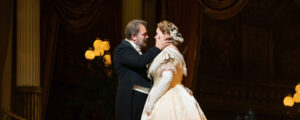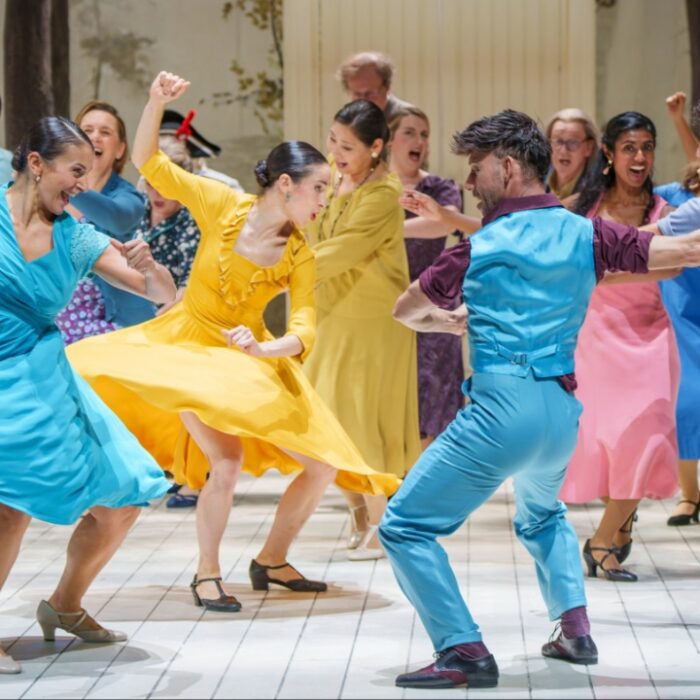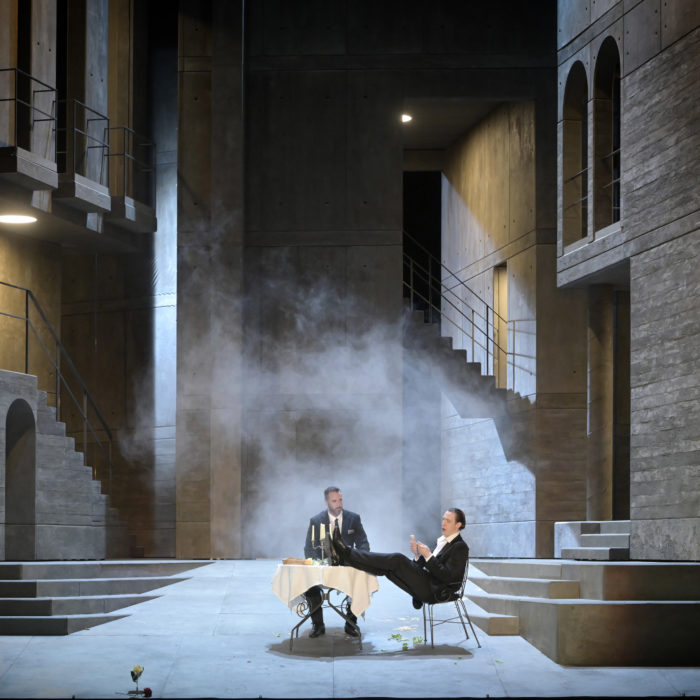
Metropolitan Opera 2025-26 Review: Arabella
Strauss’ Rarely Performed Work Returns with an Outstanding Cast
By Francisco Salazar(Photo: Marty Sohl / Met Opera)
It’s been 11 years since the Metropolitan Opera presented Strauss’ “Arabella,” one of the composer’s most beautiful and charming works, and his last collaboration with Hofmannsthal.
The work has been championed by many great sopranos and baritones throughout history. While originally scheduled for Lise Davidsen, the Met was able to find a soprano in Rachel Willis-Sorensen to meet the challenges of the work and assemble a stellar cast around her.
Traditional is Sometimes Better
For this revival, the company brought back its 1983 production by Otto Schenk, an elegant and traditional staging, that audiences clearly loved. When the curtain was lifted at the beginning of Act one and two, audiences applauded with enthusiasm. That is because the sets were lush with gorgeous Viennese detail and a palette that emphasized such period colors as beige, gold, and green with a touch of light blue in the third act.
The first set is a hotel suite decorated with period furniture and curtains, while the second act is a ballroom that goes deep into the stage, sunken into the upstage. The third act is the lobby of the hotel with a grand staircase at the center and doors at the top and bottom to give it a more realistic feel.
Costumes by Milena Canonero are sumptuous and pop within the set. Arabella’s costumes are the ones that stand out the most, with the first a brown gown that details the period’s jackets and hats, while the second gown is a white party look that emphasizes the character’s elegance and innocence.
What makes this production so effective is that the sets are spacious and allow the performers the liberty to move about. You never feel like they are constrained to a concept or to someone’s ideas. Instead, Schenk gives them environments in which they can live.
Introspection
In the title role of Arabella, Rachel Willis-Sørensen was making her role debut, and there were some tepid and tentative entrances that revealed a weak chest voice and some intonation issues in her high range. She was also a little stiff and looked uncomfortable, especially in Act one, as she twirled and waltzed around the stage. Sometimes she tended to also look at the conductor instead of her colleagues, which made the interactions between Mandryka and Arabella a little awkward in these initial moments.
That being said, the soprano Willis-Sørensen displayed an opulent tone that had a variation of dynamics. The soprano could display a floating piano, especially in her first solo, “Mein Elemer!.” Here she also showcased a spectacular legato line with a resonant middle voice. Her voice rode over the orchestral waves with delicacy, the dynamics never soft. It all felt organic as she sang the lyric lines of this introspective section, and when she got to the waltz part of the aria, her voice displayed a gleaming quality, flexible runs, and brighter timbre as she rode the legato lines in her higher tessitura. In her duet “Aber der Richtige,” she began with a lush middle voice and a piano sound that slowly grew into her higher range.
In Act two, in her first interactions with Mandryka, “Ich habe eine Frau gehabt,” Willis-Sørensen had a timidity to her persona, but slowly, her intensity grew, and you could sense her ardent urge for Tomasz Konieczny’s Mandryka. However, the soprano never let her finesse and elegance go, and the singing, while filled with more passion, still retained a restrained quality that emphasized her character’s introverted quality. You could sense that in their Act two duet as well as she said goodbye to her suitors. Perhaps it was the fact that Strauss’ music is notoriously difficult and this was her debut.
In Act three, the soprano dominated the scene from her first entrance, showcasing a smile throughout, and her singing displayed brightness and joviality in the lines. But as she was confronted by Matteo, Willis-Sørensen’s sound obtained an intensity that had not been heard in the entire evening. Her subsequent exchanges with Mandryka were perhaps the best of the evening, especially the finale “Das war sehr gut.” Here, she opened the musical passage with a floating piano sound that slowly became even more passionate as the musical passage developed, her voice opened up and the sound resonated with incredible power as she forgave Mandryka and renewed her love.
A Powerhouse
As Mandryka, Tomasz Konieczny was exceptional from his entrance emitting youthful energy. You could sense this was a man eager to meet Arabella. At the start of “Herr Graf, Sie haben Ihrem werten Brief,” his voice was suave, emphasizing his aristocratic self, but shifted to a more lyrical quality that emphasized the bass-baritone’s legato as it grew as Strauss’ music climaxed.
That same quality was seen in the second act in his first interactions with Arabella especially in “Ich habe eine Frau gehabt.” Here Konieczny’s singing had a sense of urgency, giving Mandryka impulsiveness. But Konieczny’s best moment came at the end of Act two where he lashes out upon discovering that he was allegedly betrayed. In “Ging durch einen Wald,” Konieczny dug into the text with a harsher tone and emphasized each consonant with vigor all while running arounx the stage and throwing chairs. It was a moment of unpredictably and created for some comedy as the crowd laughed at the circumstance. However, Konieczny retained his dramatic commitment, and his bass-baritone thundered throughout the auditorium. Yes the voice lost some of its brightness and luster and turned a bit rugged, but it worked for the character and the moment.
In Act three, Konieczny retained some of that bite in his delivery at the beginning but as he discovered the truth that he was not betrayd, his singing took on a smoother quality and you could could once again hear the youthful timbre from the beginning. His delivery in his small but crucial entrances during “Das war sehr gut” were full of passion and as he threw the glass of water, there was a smile all over his face.
Debutantes & Great Returns
In the role of Zdenka, Louise Alder was not only making her long-awaited Met debut but also her role debut in the opera. Alder has become one of the most in-demand lyric voices in the world, so this debut was highly anticipated and the soprano was the revelation of the evening. From the opening of the opera, Alder gave her portrayal an innocence and youthful quality. In her interactions with Matteo, while dressed up as Zdenko, you felt Alder’s excitement at the sight of Pavol Brelik’s character but also her yearning at not being able to be with the man she loved. Her voice, particularly in her Act one solos, showcased a gleaming quality as the line connected with lush timbre. Her legato phrases were also astonishing, as they continuously grew until she reached her higher notes, here were filled with delicacy and resonance. The “Aber der Richtige” duet with Willis-Sørensen also showed that delicacy and rich tone as both voices blended perfectly, and they each matched dynamics with ease. This was a moment of true introspection, but at the same time, emotion as the two longed for something they did not have. Act three wasj another standout moment as Zdenka revealed she was a woman. As Alder walked down the stairs shyly and embarrassed, you could sense the innocence of her character. Her voice revealed tenderness in her short but crucial exchange with Matteo.
Pavol Breslik returned to the Met for the first time since 2019. This was the first time audiences were seeing him in a non-Mozart role. While his voice is on the lighter side and could sometimes get lost in the immensity of Strauss’ music, Breslik showed intensity. From his first entrance in Act one during his short duet with Alder’s Zdenka, Breslik sang with a passionate tone that displayed hefty high notes and a bright middle range. He emphasized that frustration of loving Arabella but not knowing why he wasn’t corresponded to. It was astonishing that he could hold the tone without it ever wavering. That fearlessness continued in his show Act two exchange with Zdenka as well as in Act three. However, in Act three he began with a softer and suaver tone as he encountered Arabella before returning to that expressive and full-toned voice. One could sense the desperation for finding his true love. But by the end of the opera when he discovers that Zdenka is really his true love, one felt relief and happiness for him. The voice here obtained a gentler sound.
In the roles of Countess Waldner and Count Waldner, Karen Cargill and Brindley Sherrat were perfect together, showcasing their chemistry but also playing up the scheming gold-digger parents. From the opening of the opera, Cargill brought a conniving quality that was incredibly exaggerated and provided comedic outbursts, especially as she interacted with the fortune teller. Sherrat complimented Cargill’s Countess, his face lighting up when Konieczny’s Mandryka arrived, and he realized there was a chance to marry off his daughter to a rich man. Once the two were together, their exaggerated movements coupled with their lush vocal tones and precise rhythmic singing elicited a lot of laughs from the audience. They were unpredictable and just plain fun to watch.
In the role of the Fiakermili, Julie Roset made her house debut, and showed great promise. The moment the French coloratura soprano entered the stage, she was hard to look away from. Her charisma was intoxicating as she pranced around the stage, flirting with the suitors and gossiping with the guests. Vocally, she was superb in “Die Wiener Herrn verstehen sich,” singing the yodeling coloratura with precision and sparkling high notes that rang in the house.
As Count Elemer, Evan LeRoy Johnson displayed a show-stopping bright tenor, especially in his high tessitura, while Ricardo Jose Rivera showcased a booming baritone as Count Dominik. Ben Brady’s bass-baritone had a commanding presence but also great control and elegance as he courted Willis-Sørensen’s Arabella and danced with her.
Eve Gigliotti and Scott Scully provided some comic timing as the Fortune Teller and Waiter.
In the pit, Nicholas Carter led a swift orchestra that expressed the ebbs and flows of Strauss’ music. The Act three prelude was one of the highlights of the evening as it displayed some of the chaos that was about to unfold, all while controlling the orchestra and showcasing the elegance of the score. Act two saw Carter emphasize the waltz-like rhythms, and in Mandryka’s monologue, he emphasized the disorder and confusion in the situation through the orchestra’s runs. The more introspective scenes, like Arabella’s Act one soliloquy and duet and Act three finale, were full of lyricism, the orchestra holding back and slowly growing as the voices led them to the climaxes. There were ethereal colors that emphasized the elegance of Strauss’s writing. There were some moments that the orchestra could cover the singers but Carter quickly pulled the sound back, always letting the singers shine.
All in all, it is a pleasure to see this masterpiece back at the house and one hopes the company can fill the auditorium for the next five performances.


